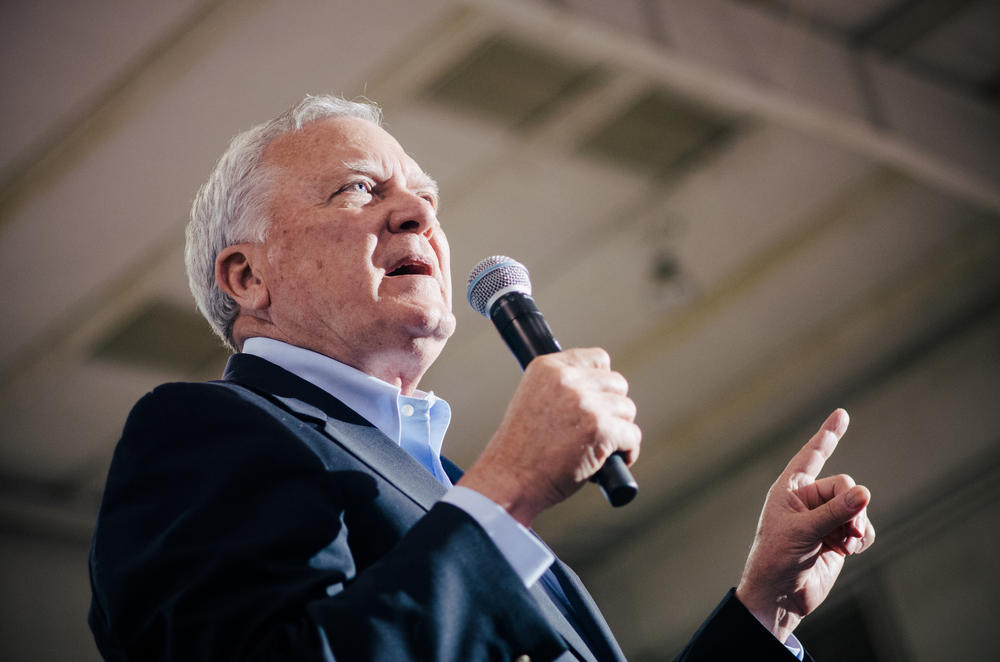Section Branding
Header Content
Last Minute Effort To Revise GA 'Religious Liberty' Bill Fails
Primary Content
Georgia's controversial religious liberty bill is now in the hands of Gov. Nathan Deal and he’s under enormous pressure from both sides of the hot-button issue.
A last ditch effort to draft new legislation and revise parts of House Bill 757 during the final hours of the session Thursday night failed.
Lawmakers were hoping to take a measure that started out as a labor-related bill, HB 904, and attach a revision of the religious liberty legislation to it. The revision was an attempt to make the contentious HB 757, which would allow faith-based organizations to discriminate against people based on a religious view, more palatable for the gay and business communities.
“That’s that 904 bill that they’re trying to rework and it’s not going to change anything. It’s not going to make those businesses happy,” House Minority Leader Stacey Abrams said late Thursday.
Lawmakers ran out of time, even working past midnight on Sine Die, but they were unable to get the revision effort done at such a late hour.
After a three month battle marked by fierce debates and back room maneuverings and deal making, the same contentious version of the bill that passed the legislature last week is still on the governor’s desk awaiting action.
But the measure is facing an uncertain future. The impact of a business backlash on the state’s economy over the legislation is certainly a concern for Deal, who has worked steadily during his time in office to create a climate of economic growth while luring companies, especially from the tech and film industries, into Georgia.
Major business interests, including the NFL and local sports franchises like the Atlanta Falcons and the Atlanta Braves, film industry leaders like Walt Disney and Marvel Comics, and other major corporations like Delta Airlines and Coca-Cola, have threatened to cut ties with Georgia, if HB 757 is signed into law.
Conservative Sen. Josh McKoon (R-Columbus), the author of one of almost a dozen religious liberty bills introduced over the past several General Assembly sessions, was one of several lawmakers leading the charge to get religious liberty passed this session.
McKoon told GPB News he isn’t worried about the threats from businesses and that he doesn’t take it seriously.
“I find the hypocrisy of those threats breathtaking in scope,” he stated during an interview on the last day of the legislative session.
“These are all companies that do business routinely with regimes that are atrocious on human rights issues. The NFL’s talking about playing a game in China, major league baseball just had an event in Cuba when the president was there, countries that have terrible human rights records. Some of these individual companies do businesses in the Middle East, where being homosexual is a capital crime,” McKoon said.
“The idea that they’re going to make a business decision on anything other than the tax and regulatory policy of this state is just ridiculous. It’s not going to happen.”
But what might happen is the governor could bow to pressure from the business and gay community. Deal said last month that he didn’t think religious liberty legislation was needed in Georgia, leading opponents of the measure to suggest he won’t sign it.
But McKoon said if Deal doesn’t sign the measure, it won’t end the effort to get a religious liberty passed in Georgia.
“I certainly hope that the governor will concur with the overwhelming majority of the General Assembly and sign the bill, so that we can move on to other issues because I can assure you, if the governor vetoes this legislation, we will be back next year dealing with this issue again,” the conservative Republican from Columbus said.
Atlanta Democrat Rep. Keisha Waites, only the fourth openly gay member of the Georgia Legislature, said she was disappointed with the religious liberty bill. “I’m very concerned about the economic impact. I think it sends the wrong message, in terms of who we are in Georgia.”
Waites’ colleague in the other chamber, Sen. Elena Parent (D-Atlanta), believes the religious liberty bill is a “black mark” on Georgia. Parent says it’s a “huge overreach from a super majority that’s totally out of step with the feelings of Georgians as a whole.”
Gov. Deal, meantime, has just over a month, until May 3 to either sign HB 757 into law or veto it.
Ray Metoyer, Keocia Howard, and Enna Garkusha contributed to this story.

